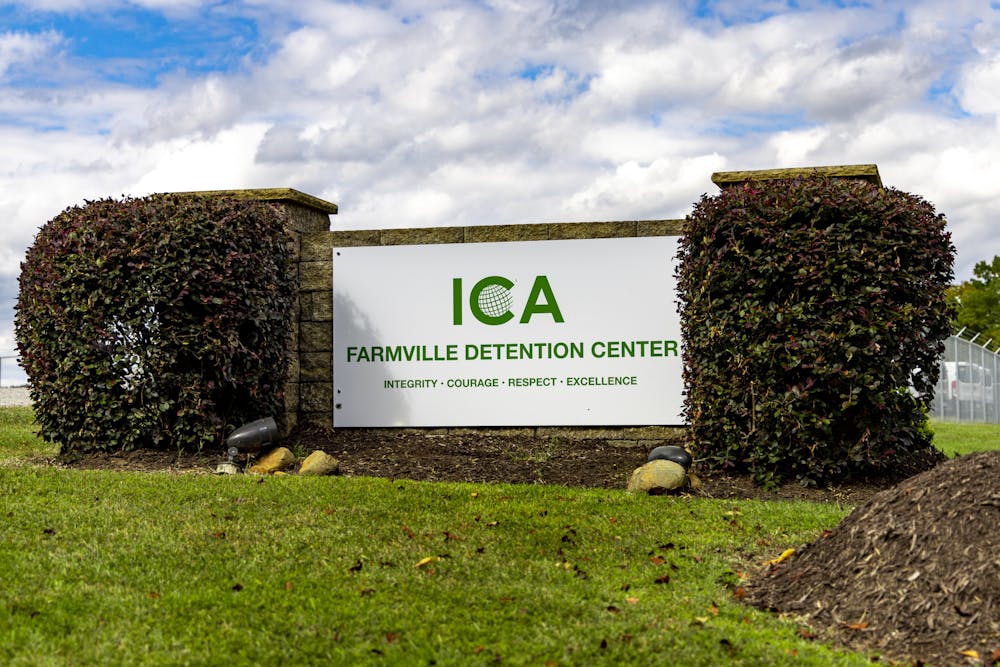An immigrant detention center in Farmville, Va., a town 60 miles south of Charlottesville, has received calls from students, undocU.Va. and other activist groups across the country demanding the center close, citing unlawful and inhumane practices. University students specifically have taken interest in the issue, spreading activist efforts outside the Charlottesville area.
Immigration Centers of America’s Farmville division has made headlines over the years for poor conditions for those detained — a report arguing for the center’s closure published by Detention Watch, a national group advocating for the closure of ICA centers across the country, alleges misconduct by ICA Farmville.
“People detained at the facility have been subject to harsh conditions, including use of force, solitary confinement, retaliation by staff, inadequate medical and mental health care, meager and barely edible food and limited access to counsel and family members,” the report reads.
Controversy also arose over a lawsuit filed in August against ICA Farmville by the Virginia chapter of the American Civil Liberties Union alleging three Central American men were illegally detained in the facility after winning their immigration cases — the lawsuit was settled and the men were released later that month, but media attention thrust the mistreatment of detainees into activist spheres.
Allegations also include a history of health issues. In 2020, 93 percent of detainees contracted COVID-19 after U.S. Immigration and Customs Enforcement transferred detainees from areas with high rates of the virus.
The outbreak ultimately led a federal judge to bar ICE from transferring anyone to the facility until July 2022. The center has slowly reopened since then, under increased restrictions. ICA Farmville went from having as many as 800 people to having only 60 as of this July.
UndocU.Va. — a student group focused on creating a safe space and advocating for undocumented students — organized a group to travel to a town council meeting Sept. 13 to express their views on why the detention center should be closed.
A student who spoke at the meeting said she and her family feel personally impacted by ICA Farmville because her own brother was detained in the facility. She said he got sick frequently because of unsanitary conditions before ultimately being deported.
The student said she feared that other undocumented Virginians, including those at the University, could be at risk of detainment under poor conditions at ICA Farmville.
“There are undocumented students and staff at the best school in the state and number two public school in the nation,” the student said.
Edward Strickler, Farmville resident and school of medicine alumnus, saw the students’ self-insertion into the debate as “elite supremacy.” Strickler said they failed to account for the center’s importance for the local economy.
“In any case the conduct of elite university students — ignorant and/or careless of the social ecology of rural working class communities — is not at all surprising,” Strickler said in a statement to The Cavalier Daily.
When asked about University students who spoke at the Sept. 13 town council meeting, Farmville Mayor Bruce Vincent says he’s a firm believer in participation in democracy. Still, he acknowledged concerns about elitism by discussing the quality of the education at the University.
“There were a couple of those qualifiers in their introduction, which definitely caught the ears of multiple residents here,” Vincent said. “You’re in our backyard. You’re in Longwood’s backyard.”
ICA Farmville’s contract with the city of Farmville was initially set to expire Sept. 15, and the council chose to renew it for two more weeks to determine the center’s future. The council then voted to take six more months to make a call on how to proceed.
Farmville would lose a significant amount of money from ending the contract — notably from lost jobs. A 2015 study commissioned by ICA Farmville found that the center provided $8.4 million in economic output for Farmville and Prince Edward County. Wages of those employed by the center were 30 percent higher than the local average.
“You’re in the middle of the budget year,” Vincent said. “To then blow a hole like that in the budget, it’s just not very fiscally responsible.”
However, the contract may soon be out of Farmville’s hands, with a clear path toward a direct contract with the federal government, according to Vincent. A direct contract would keep the ICA location in Farmville and still provide jobs to residents — a main concern of those opposed to closing the center — but would keep the Town of Farmville out of the finances.
Ultimately, Vincent says the issue is not Farmville’s responsibility, arguing that broader immigration reform and de-politicization of the issue is the remedy. Immigration reform has been stalled in the U.S. for several years. A major bipartisan attempt to improve the hotly contested situation in 2013 failed, and no legislation has been passed since.
“Is it unfortunate that our immigration system is broken? Absolutely,” Vincent said. “But until we lobby aggressively for national politicians to quit sitting on their hands, and advantageously using the immigration issue as a political football every election, this is the world we’re gonna be in.”
Notably, ICE officials say the contract's expiration would not automatically free detainees — they would simply shift to another facility.
The town’s six-month contract extension will expire in March, when Vincent and the council will again be faced with a decision on how to proceed.







